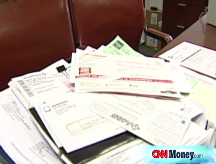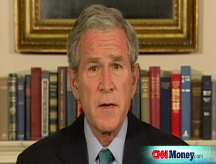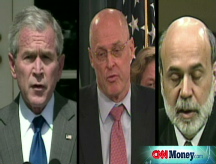Stocks end lower before vote
Investors await $700 billion bank rescue vote in the Senate.

NEW YORK (CNNMoney.com) -- Stocks trimmed losses by the close Wednesday, but investors remained edgy ahead of a Senate vote on the modified $700 billion bank rescue plan, expected later tonight.
Credit markets remained pinched, with closely watched measures of bank fear still at elevated levels. The ISM manufacturing index, a key reading on the economy, fell to a seven-year low near a level that suggests a recession.
The Dow Jones industrial average (INDU) lost 0.2%. The Standard & Poor's 500 (SPX) index slid 0.5% and the Nasdaq composite (COMP) lost 1.1%.
The Dow fell more than 100 points in the morning, but curbed those losses in the afternoon as more specifics about the modified bailout plan were released. Financial and homebuilding shares rallied, but many other stock sectors declined, including technology and oil services.
General Electric (GE, Fortune 500) trimmed losses, but remained in the red after it said that Warren Buffett's Berkshire Hathaway will buy up to $6 billion of its stock. The stock has been under pressure throughout the session on worries about its 2009 earnings.
Meanwhile automakers were reporting September sales, with Ford Motor (F, Fortune 500) announcing a bigger-than-expected decline and General Motors (GM, Fortune 500) a narrower-than-expected drop.
"There's a big drip of negative news on the economy right now, but the market seems to be fully focused on the prospect of a bailout," said Bill Flaig, portfolio manager at Arrow Funds.
Eli Lilly (LLY, Fortune 500) is in late-stage talks to buy Erbitux maker ImClone for $70 a share or $6.1 billion, The Wall Street Journal reported after the close Wednesday.
Wednesday also brought the release of a number of dour economic reports, including one that suggested a near-recessionary environment. The ISM manufacturing index fell to 43.5 in September, nearing a level that implies recession. Any level below 50 shows weakness. Economists thought it would dip to 49.5 in the month from 49.9 in August.
Oil prices slipped below $100 a barrel, while gold prices were little changed. Treasury prices gained, lowering the corresponding yields. The dollar was mixed versus other major currencies.
Senate to vote: The Dow jumped 485 points Tuesday in a broad-based rally on bets that some form of the bailout will ultimately get passed. On Monday, the Dow slumped 777 points, its biggest one-day point loss ever, after the House of Representatives failed to pass the Bush administration's bailout plan.
The modified version of the bailout proposal goes before the Senate Wednesday night and is expected to have bipartisan approval. The House will take up the matter again later in the week. (For more on the bill, click here)
Confidence that a bill will eventually be passed soothed markets - but didn't push them higher.
Passage of the bill has been priced into the market now, Flaig said. "The debate has moved on to what it will mean, whether it will be as effective as hoped and whether it's all coming too late."
Critics argue that the plan, while critical for both Main Street and Wall Street, won't keep the economy from slowing further.
Company news: Automakers were reporting September sales throughout the session. Among those that have reported, Ford Motor (F, Fortune 500) said sales slumped 34% in the month, worse than expected. GM (GM, Fortune 500) said sales fell 16%, which was not as bad as expected.
General Electric (GE, Fortune 500) slipped 4% as the Warren Buffett news vied with an earlier report from a Deutsche Bank analyst that speculated the company's earnings will decline last year. GE said last week that earnings could fall as much as 12% this year.
Financial stocks rallied. Citigroup (C, Fortune 500) added 12%, Bank of America (BAC, Fortune 500) gained 9% and Merrill Lynch (MER, Fortune 500) gained 5.5%.National City (NCC, Fortune 500) climbed 65% as worries that it won't survive dissipated after several rough sessions for the bank.
But big techs dipped, with IBM (IBM, Fortune 500) down 5.8% on skepticism about its quarterly earnings. Other tech losers included eBay (EBAY, Fortune 500) off 6.8% and Oracle (ORCL, Fortune 500) down 2.2%.
Bailout plan: The bill will let the Treasury Department buy bad mortgage assets from banks, to be held and ultimately sold if and when the market improves.
Ideally, with cleaner balance sheets, banks would be able to start lending to each other again, defrosting the frozen credit markets. With a market for the debt, prices would eventually rise.
Modifications include raising the FDIC insurance cap to $250,000 from $100,000. The FDIC is the agency that insures depositors in case of a bank failure and raising the caps would make businesses and individuals less anxious to withdraw money from accounts at a struggling bank. (Full story)
The $700 billion plan was hatched in the wake of a series of bank failures and mergers amid the housing market collapse and subsequent credit market freeze up. Frozen credit markets mean banks cling to cash, making it difficult for businesses and individuals to get needed loans.
But so far, while stocks have seesawed over the last week, credit has remained tight.
Credit markets: Businesses depend on the credit markets to function on a daily basis, and the absence of ready capital has threatened to stall the broader financial system.
Several measures of bank nervousness remained elevated Wednesday, suggesting that despite the likelihood of a bailout going through, banks are skeptical as to how much impact it will have.
"It's unclear whether the purchasing of these assets will stabilize balance sheets," said Alan Gayle, senior investment strategist at RidgeWood Investments. In addition, he noted that there are ongoing questions about how to value the assets in the first place.
3-month LIBOR, which banks charge each other to borrow for three months, jumped to 4.15% from 4.05% late Tuesday.
The TED spread, which is the difference between 3-month Libor and what the Treasury pays for a 3-month loan, rose to 3.42% from 3.15% late Tuesday. On Monday, the TED spread hit a more than 26-year high above 3.50%.
If banks are relatively confident, they should charge each other not much more than the U.S. government. When the spread widens, that indicates rising jitters.
The yield on the 3-month Treasury bill, seen as the safest place to park money in the short term, fell to 0.79% from 0.88% late Tuesday. On Monday, the yield fell to 0.14% as panic gripped the markets. Earlier this month, the three-month bill skidded to a 68-year low around 0%. (Full story)
Long-term government debt prices rallied and the yields slipped. The benchmark 10-year Treasury note rallied 21/32, sending the corresponding yield down to 3.75% from 3.82% Tuesday. Treasury prices and yields move in opposite directions.
Economy: August construction spending was flat, the government reported, versus forecasts for a drop of 0.5%. Spending fell a revised 1.4% in July.
Employers in the private sector cut 8,000 jobs from their payrolls in September versus forecasts for a cut of 53,000, said payroll processing firm ADP. The report precedes Friday's broader government employment figures.
Oil and gold: Oil prices cut losses after dipping sharply on the government's weekly inventories report, which showed oil inventories rose more than expected and gas inventories rose versus forecasts for a decline.
U.S. light crude oil for November delivery fell $2.11 to settle at $98.53 per barrel on the New York Mercantile Exchange. (Full story)
Oil prices had plummeted over $55 after peaking at $147.27 a barrel on July 11, as investors bet that sluggish global growth will diminish oil demand. But the recent acceleration of the financial crisis had caused investors to buy up commodities in a safer-haven play.
COMEX gold for December delivery rose $6.50 to settle at $887.30 an ounce. Like oil, gold prices rallied during the biggest periods of unrest over the last few weeks.
Other markets: In currency trading, the dollar rose against the euro and fell against the yen.
Gas prices fell for the 14th day in a row, according to a nationwide survey of credit card activity.
In global trading, Asian markets ended lower, and European markets ended mostly higher.
Worried about your retirement? Tell us your story ![]()




